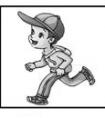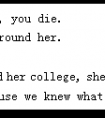按要求做题。1. we’re, relaxed, pretty time, not, in, about, Switzerland (连词成句)2. I don't know how I can get to the zoo.(改成简单句)I don't know howto t-九年级英语
1. 指事物
作为人称代词,it 可以除人以外的一切事物或动物。如:
I dropped my watch and it broke. 我把手表掉在地上摔坏了。
It’s hard work, but I enjoy it. 工作很辛苦,可是我乐意干。
“Where is the dog?” “It’s in the bedroom. ” “狗在哪?”“在卧室里”。
2. 指人
it 指人主要用于指不性别不明的婴儿或用于确认某人的身份。如:
Is it a boy or a girl? 是男孩还是女孩?
There is a knock on the door. It must be the postman. 有人在敲门,一定是邮递员。
【说明】在答语中,常用来指本人,如说 It’s me。
3. 代替某些代词
代词 it 还可用于代替指示代词this, that 以及复合不定代词 something, anything, nothing等。如:
“What’s this?” “It’s a new machine. ” “这是什么?”“是一种新机器”。
Nothing is wrong, is it? 没出什么问题,是吗?
二、it 作非人称代词的用法
1. 基本用法
it 作非人称代词的用法,主要用于指时间、距离、价值、天气、气候及温度等自然现象。如:
It’s too late to go there now. 现在去那儿已经太迟了。
It rained all day yesterday. 昨天下了一天的雨。
It can get very hot here. 这里有时会很热。
2. 用于某些句型
It’s time for sth. 该做某事了。
It’s time to do sth. 该做某事的时候了。
It’s time for sb to do sth. 某人该干某事了。
It’s (about / high) time + that-从句. 某人该做某事了。(从句谓语用过去式,有时也用“should+动词原形”)
It’s first (second) time + that-从句. 某人第几次干某事。(从句谓语用现在完成时)
It’s + 时间段 + since-从句. 自从……有一段时间了。
It’s + 时间段 + before-从句. 过多长的时间才……
三、it用作形式主语
1. 基本用法
当不定式、动名词、从句等复杂成分用作句子主语时,为保持句子平衡,通常把真正的主语放在句末,而在句首使用形式主语it。如:
It’s very important to remember this. 记住这一点很重要。
It’s hard work climbing mountains. 爬山是费劲的事。
It’s unknown when he will come. 他什么时候来还不知道。
2. 用作形式主语的的重要句型
(1) It + be + adj. for (of) sb to do sth 某人做某事……
It is hard for him to make up his mind. 他很难下定决心。
It was foolish of her to say such a thing. 她说那样的话,真是太蠢了。
【说明】介词 of 与 for 的区别是:
of 用于指某人的性格、属性、特征等,介词for表示对象,意为“对……来说” 。
(2) It takes sb + 时间段 + to do sth. 某人做某事花了……时间
It takes years to master a new language. 要花多年的时间才能掌握一门新的语言。
【说明】此句型可以有以下多变种变体:It took me an hour to write the letter.
=The letter took me an hour (to write). =I took an hour to write the letter. 我写这封信花了一个小时
(3) It is up to sb to do sth. 该由某人做某事
It’s up to you to to make the choice. 得由你来作选择。
(4) it look (seem, appear, happen, occur) that [as if]… 似乎……
It seemed as though he didn’t recognize me. 他似乎没认出我来。
It happened that I was out when he called. 他打电话时我碰巧不在家。
(5) If it were not for… / If it hadn’t been for… 若不是因为……
If it were not for their help, we couldn’t have got over the difficulties. 要不是他们帮助,这些困难我们不克服不了的。
四、it用作形式宾语
1. 基本用法
当不定式、动名词、从句等复杂成分用作宾语且其后跟有宾语补足语时,通常会在宾语补足语前使用形式宾语,而将真正的宾语移至句末。
其基本结构为“动词+it+宾语补足语+不定式(动名词或从句)”。如:
I find it difficult to do the job well. 我发现做好这件事不容易。
I think it best that you should stay here. 我认为你最好住这儿。
We think it no use complaining. 我们认为抱怨是没有用的。
2. 用作形式宾语的几个特殊结构
(1) 动词+ it + that-从句。如:
I like it that you came. 你来了,我很高兴。
I take it (that) he will come on time. 我认为他会准时来的。
You can put it that it was arranged before. 你可以说这是以前安排的。
Rumor has it that the defence minister will soon resign. 据传闻,国防部长不久就要辞职。
【说明】能用于此结构的动词不多,常见的有 have, take, put, like 等。
(2) 动词 + it + when (if)-从句。如:
I dislike it when you whistle. 我不爱听你吹口哨。
We really appreciate it when she offered to help. 她来帮忙了,我们十分感激。
I’d prefer it if I didn’t have to do so much work. 要是我不必做那么多工作,好就太好了。
【说明】能用于此结构的动词不多,常见的有 enjoy, hate, love, like, dislike, appreciate, prefer 等。
(3) 动词 + prep + it + that-从句。如:
See to it that you’re not late again. 注意千万不要再迟到。
Look to it that this doesn’t happen again. 注意不要再发生这种事。
You may rely on it that he’ll come to meet you. 你放心,他会来接你的。
I can’t answer for it that he will come. 我不能保证他会来。
【说明】能用于此结构的动词不多,常见的有see to, look to, insist on, stick to, depend on, answer for 等。
(4) 动词 + it + 介词短语+ that-从句。如:
I owe it to you that I am still alive. 多亏有你我才仍然活着。
I took it for granted that he would help us. 我认为他会帮助我们的。
【说明】能用于此结构的动词不多,常见的有take it for granted, bring it to sb’s attention, owe it to sb 等。
it在强调句中的使用
It is+被强调部分+that(who)+其他
在使用强调句型时需注意以下几点:
1. 请注意强调句型的特殊疑问句
2. 在强调原因状语从句时,只能强调由because所引导的从句。
3. 在强调not … until结构时必须把not与until一起放到被强调的位置上。
4. 注意强调句型与定语从句的区别。
5. 不管被强调部分是单数还是复数,其前一律用It is / It was,而不能用They are / There were之类的。
6. 被强调部分是指人时,被强调部分后可用that / who,被强调部分指物时,被强调部分后只能用that。
7. 被强调部分是指时间或地点时,被强调部分后通常用that,一般不用when,where之类的。例:
It is I who am right. 是我对。
It was you that were wrong. 是你错了。
It was in the Japan that he died. 他是死于日本。
It was yesterday that he got married. 他是昨天结婚的。
It was a computer that he bought last week. 他上个星期买的是一台电脑。
Where was it that she lived? 她是住在什么地方?
When was it that he left for Japan? 他是什么时候离开去日本的?
Who is it that teaches you English? 是谁教你们英语?
- 最新内容
- 相关内容
- 网友推荐
- 图文推荐
| [家长教育] 孩子为什么会和父母感情疏离? (2019-07-14) |
| [教师分享] 给远方姐姐的一封信 (2018-11-07) |
| [教师分享] 伸缩门 (2018-11-07) |
| [教师分享] 回家乡 (2018-11-07) |
| [教师分享] 是风味也是人间 (2018-11-07) |
| [教师分享] 一句格言的启示 (2018-11-07) |
| [教师分享] 无规矩不成方圆 (2018-11-07) |
| [教师分享] 第十届全国教育名家论坛有感(二) (2018-11-07) |
| [教师分享] 贪玩的小狗 (2018-11-07) |
| [教师分享] 未命名文章 (2018-11-07) |






